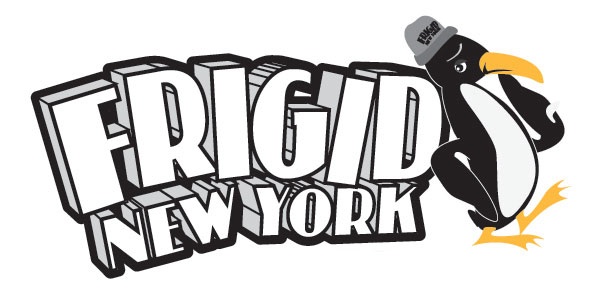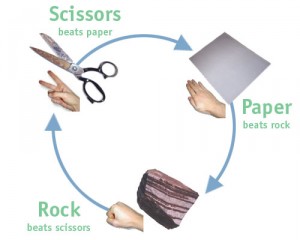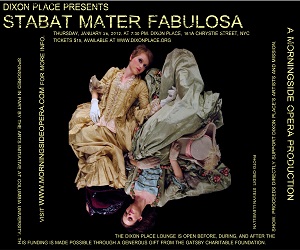
Welcome back to another installment of FRIGID New York Festival 2011 Q&A! We’ll be running these throughout February until the Festival starts, so be sure to check back to read all about the great shows that will be taking part in the festival. Also – don’t miss the winner-take-all game of Rock Paper Scissors! Today’s Q&A is with David Mogolov who is the Writer/Performer of There Is No Good News.
Bringing together bullwhip-armed children, bomb scares, and runaway fryalators, There Is No Good News is Mogolov’s hilarious search for something—anything—he can teach his daughter. Somewhere between Spalding Gray doing slapstick and Mike Birbiglia analyzing McLuhan, Mogolov’s style is relaxed, congenial, and witty, sneaking insights in between near-constant laughs.

There Is No Good News featuring David Mogolov (Photo by Daniel Van Ackere)
answers by David Mogolov, Writer/Performer
Antonio Asks: What makes FRIGID such a warm and welcoming experience for your production?
When I got notified of my acceptance, I was a bit concerned about logistics, and I emailed a former FRIGID participant whose work I admire, and he sent me back an email singing the praises of the festival staff and the community around it. He was completely right. Even though I’m coming from out of town on my own, the festival staff and volunteers have made the whole process remarkably easy. Everybody involved with the festival has been really helpful and friendly. It says something about the festival that even my stupiestd FRIGID questions get fast, funny, useful responses from people I’ve never met. They’re really committed to getting this right.
Diánna Asks: What about this play do you feel most drawn to personally, and because of that, what message do you hope the audience walks away with?
Well, the show is written from my own experience, but I try very consciously to approach it with a self-critical (some might say self-lacerating) eye. What draws me back to the stories isn’t self-glorification or nostalgia, but the surprise at discovering over and over again that I missed something obvious, that a story isn’t about what I thought it was, that no matter how much I might have learned or grown, I still haven’t figured out the basics. I think unveiling this sort of critical process onstage really catches audiences personally. The facts are mostly mine, but the blunders and the failings are universal.
Karen Asks: That’s some title. How did you come up with it – and what does it mean?
So many possible answers! It does actually appear in the text of the show, but almost by accident. The title was settled long before that line appeared in a revision, and then it just fit the moment. Partly, the title is a reaction to the time I was writing. The headlines were just a string of catastrophes. Even the silver linings seemed carcinogenic, and I’m sitting there trying to write a comedy. At the most basic level, though, “There Is No Good News” sort of sums up the central problem of the show: what can I tell my daughter about almost any of these big problems we’re facing? And what are her odds of making it when her father has a solid track record of idiotic behavior? Is this kid doomed?
Stephen Asks: You must have a favorite part of your show. What makes it your favorite?
There is one joke in the show that I love more than all the others. It’s super, super nerdy, and it gets a very different type of laugh than any other in the show. Every time I get through it, I have to pause and give it a little moment. Just when I think it’s failed, I start to hear a laugh from a portion of the audience, and usually one or two people end up laughing very loudly. At that moment I know where the philosophy majors are sitting in the audience. It’s a pretty narrow joke, but I can’t give it up. I guess it’s my vice.
Lina Asks: How much of your show was inspired by true events?
Every bit of it. Those events went through the standard bends, folds, consolidations and simplifications that go into turning fact into comedy, but I’m confident that if it’s not all factual anymore, it’s still nonetheless true.

THM Bonus Question: If you could play a virtual game of Rock, Paper, Scissors with another FRIGID Show which show would you take on? And what would you throw?
“Wonder Woman: A How To Guide for Little Jewish Girls”. I’d throw paper. Throwing rocks and scissors is pretty rude.
Thanks There Is No Good News – for participating in The Happiest Medium’s FRIGID New York Festival 2011 Q&A. And for playing our game! You’re officially PAPER. If you read her Q&A you know that Wonder Woman: A How To Guide For Little Jewish Girls threw out a POLYGRAPH MACHINE. While clever, it also doesn’t beat anything. And PAPER can cover anything, so by definition – you WIN!!! CONGRATULATIONS! See, David – there IS good news! This is how it works in the crazy world of the VIRTUAL ROCK PAPER SCISSORS TOURNAMENT!
Meanwhile, for the rest of you – don’t forget to check out There is No Good News!
There is No Good NewsWritten by David Mogolov & Directed by Steve Kleinedler
Presented by The Plant Boston, MA
The Red Room (85 East 4th Street) $10Thu 2/24 @ 6:30pm, Sat 2/26 @ 2pm, Tue 3/1 @ 9:30pm, Fri 3/4 @ 8pm, Sat 3/5 @ 5pm, & Sun 3/6 @ 6:30pm
FRIGID New York Festival 2011 will run February 23-March 6 at The Kraine Theater & The Red Room (85 East 4th Street between 2nd Ave and Bowery) and UNDER St. Marks (94 St. Marks Place between 1sr Ave and Ave A). Tickets ($10-$16) may be purchased online at www.FRIGIDnewyork.info or by calling Smarttix at 212-868-4444. All shows will run 60 minutes long or less.



{ 0 comments… add one now }